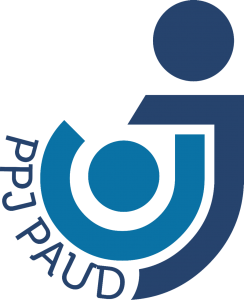PENINGKATAN KECERDASAN INTERPERSONAL MELALUI BERMAIN MUSIK
Abstract
The purpose of this research was to describe the implementation process play music and to understand improving interpersonal intelegence of children 4-5 years old through play music. The study was conducted on group A Kindergarten with of seventen children. This study used action research methods by Kemmis and Taggart which consist of 4 stages (plan, action, observation and reflection). This study consisted of two cycles, each cycles consisting of 8 sessions. Data collecting techniques used observation, field notes and documentation. Data analysis using quantitative and qualitative data. Quantitative data analysis with descriptive statistics that compare the result obtained from the first cycle and the second cycle. Analysis of qualitative data by analizing data from the observation, fields notes and documentation during the study to the steps of data reduction, data display and data verification. The result of this study showed that there was the improving interpersonal intelegence through play music with score in pre cycle 33,8 had improvement to 50, 4 and become 60,7 in cycle II and excellent growing category.
Keywords : Interpersonal Intelegence, Play Music, Action Research
Full Text:
PDFReferences
Elizabet B. Hurlock. 1978. Perkembangan Anak. Jakarta. PT. Gelora Aksara Pratama.
Eva Brand dan Ora Bargil. 2010. Improving Interpersonal Communication through Music
Fang-Mei Tai. 2014. Exploring Multiple Intelligences . The Journal of Human Resource and Adult Learning, Vol. 10, N 12 um. 1, June 2014 issue.
George Morisson. 2012. Dasar-Dasar Pendidikan Anak Usia Dini. Jakarta: Indeks.
Gestwicki. 2007. Developmentally Appropriate Practice Curriculum and Development In Early Education.Kanada:Delmar
Hilda L. Jackman. Early Education Curriculum A child’s Connection to The World. USA: Wadsworth.2012.
Howard Gardner and Thomas Hatch.1989. Multiple Intelligences Go to School: Educational Implications of the Theory of Multiple Intelligences. Journal of Educational Researcher, Vol. 18, No. 8 (Nov., 1989), pp. 4-10 Published by: American Educational Research Association.
Jane Arnold Morgan & Mª Carmen Fonseca. 2004. Multiple Intelligence Theory and Foreign Language Learning: A Brain-based Perspective. IJES, vol. 4 (1), 2004, pp. 119-136
Jo Ann Brewer. Early Childhood Education Preschool Through Primary Grades. 2007. USA: America.
Joan Bouza Koster. Growing Artists Teaching The Arts to Young Children. USA: Wadswort.
Jonathan Bolduc: 2009. Effects Of a Music Programme On Kindergartners Phonological Awareness Skills. International Journal Of Music Education Vol 27(1).3747(200902)27.1.10.1177/0255761408099063
Katrin Hille, et all : 2011. Association Between Music Education, Intelligence, And Spelling Ability In Elementary School. Research Article Advances In Cognive Psyschology Volume 7: 1-6 DOI:10.2478/v10053-008-0082-4
Kelly R.Paquette dan Sue A. Rieg. The Influence of Music on the Children”s Art Expression. Early Childhood Educ J (2008) 36:227-232. DOI 10.1007/s10643-008-0277-9
Rebecca T. Isbell & Shirley C. Raines. Creativity And The Arts With Young Children. Canada: Delmar.2007
S. Filivopic dan G. Grujic- Garic.2011. The Influence of Music on the Children”s Art Expression. Journal plus education, ISSN:1842-077X, E-ISSN(online) 2068-1151 Vol VII (2011), N0 2, pp 223-240
Sibel Gurbuzoğlu Yalmanci & Ali İbrahim Can GOZUM. 2013. The Effects Of Multiple Intelligence Theory Based Teaching On Students’ Achievement And Retention Of Knowledge (Example Of The Enzymes Subject. International Journal On New Trends In Education And Their Implications July 2013 Volume: 4 Issue: 3 Article: 04 Issn 1309-62Jou1309-6249
Skinner.Creative Activities for the Early Years. London: Paul Chapman Publishing.2008.
Susan Hallam:2010. The Power Of Music : Its Impact On The Intellectual, Social And Personal Development Of Children And Young People. International Journal Of Music Education 28:269. DOI:10.1177/0255761410370658.
Thomas Amstrong. Multiple Intelligences In The Clasroom. USA:ASCD.2009
DOI: https://doi.org/10.31326/jcpaud.v1i1.6
Refbacks
- There are currently no refbacks.
Editorial Address
Universitas Trilogi jakarta
Jalan TMP Kalibata No.1, RT.4/RW.4, Duren Tiga, Kec. Pancoran, Kota Jakarta Selatan, Daerah Khusus Ibukota Jakarta 12760




.png)



